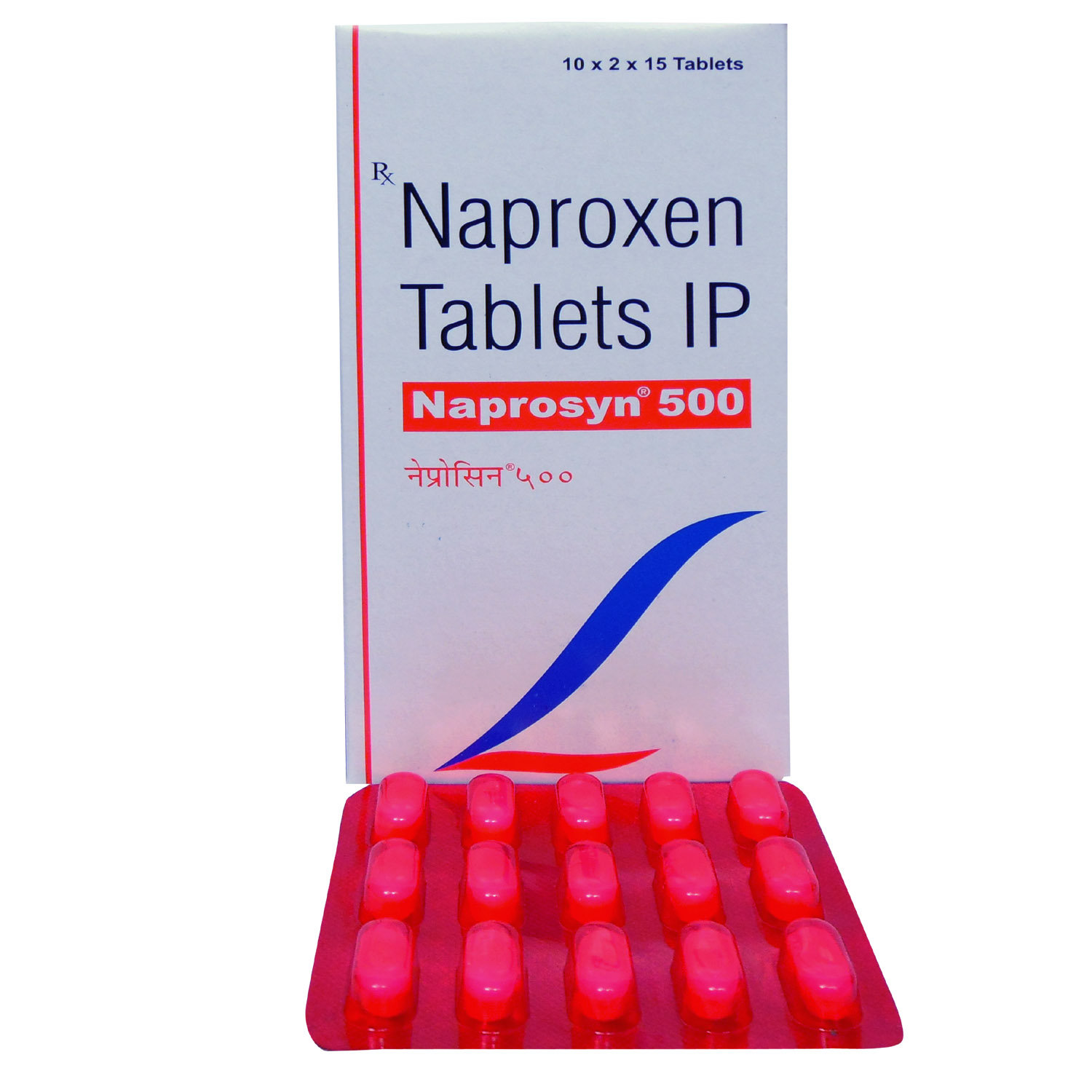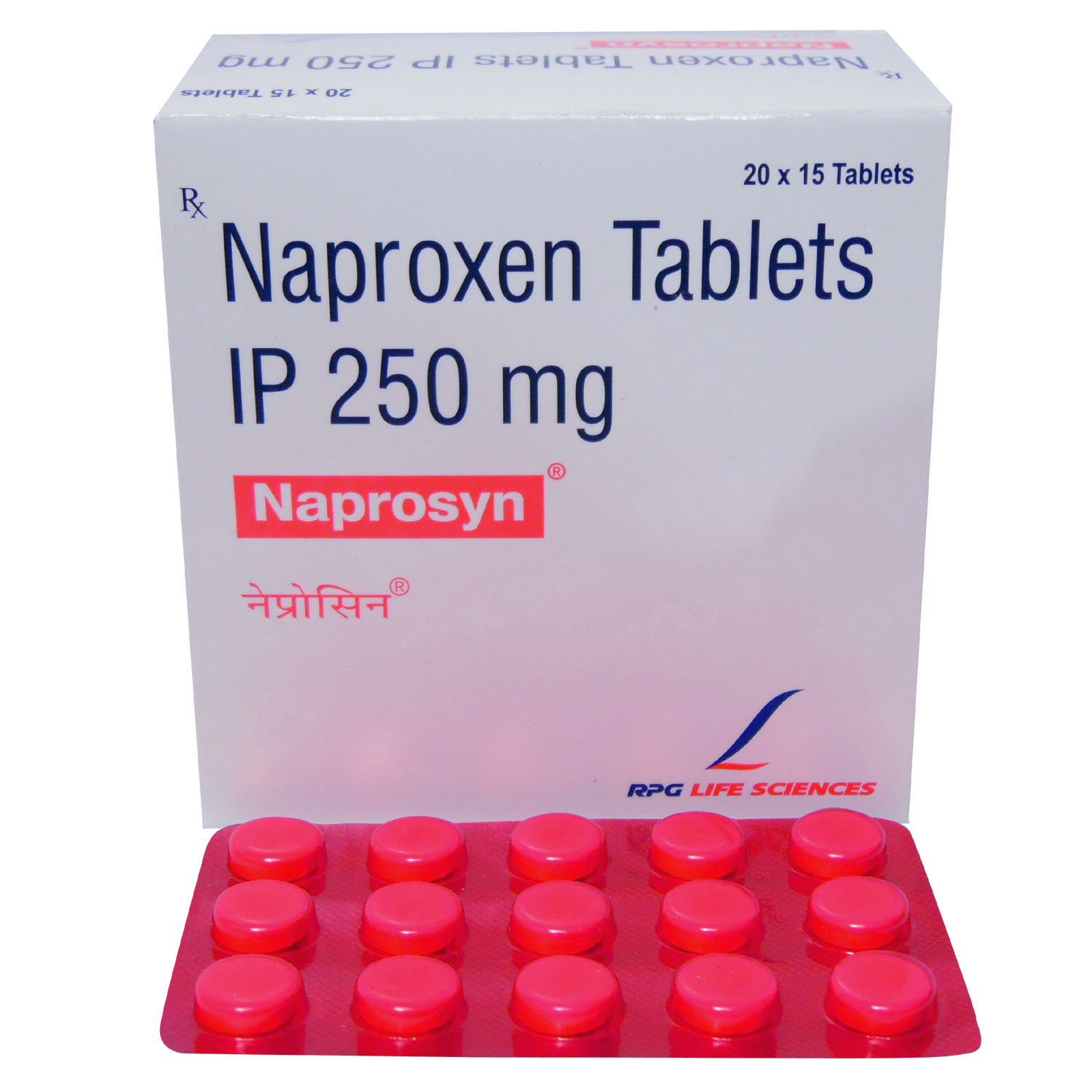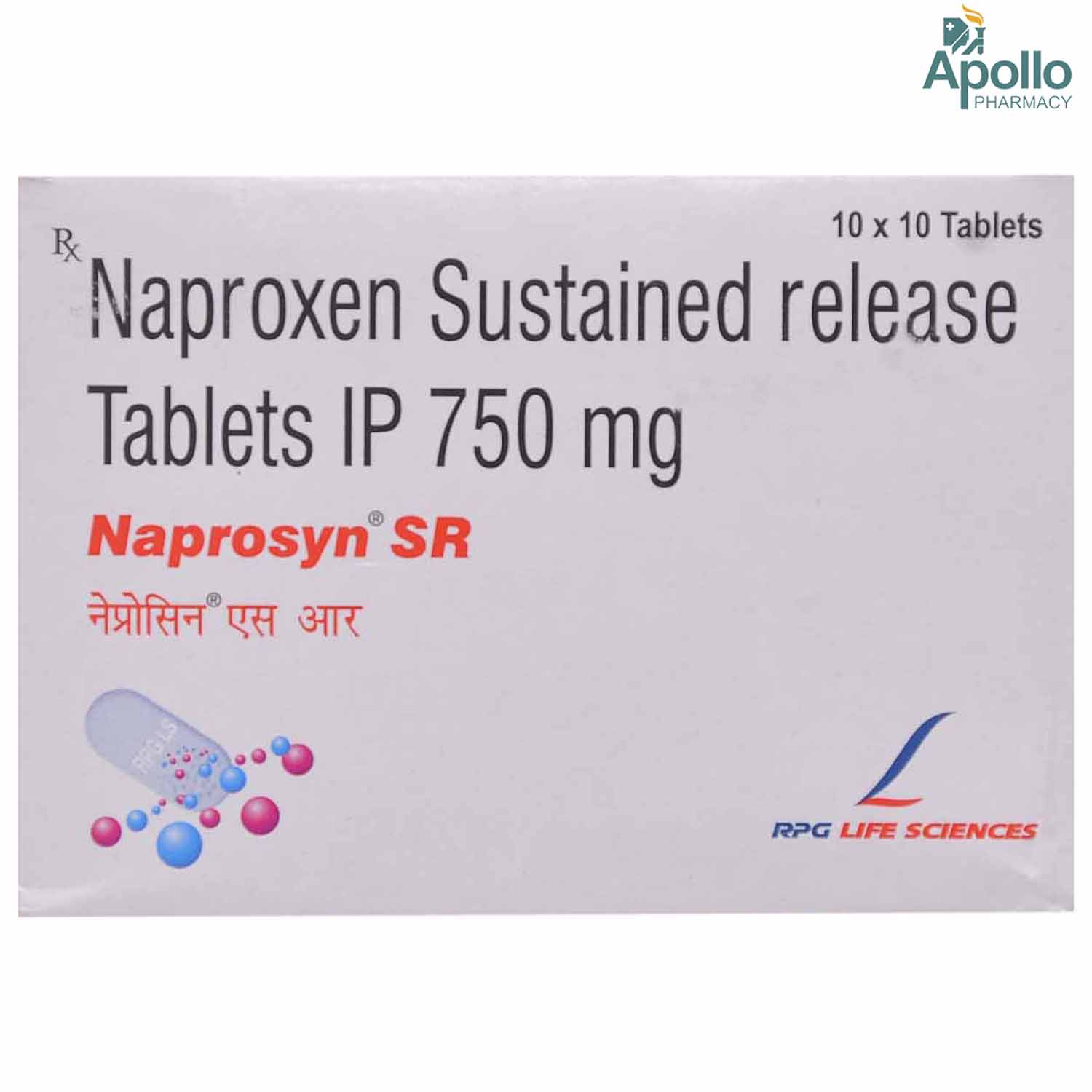Naproxen
About Naproxen
Naproxen belongs to a class of pain killers known as non-steroidal anti-inflammatory drugs (NSAIDs). Naproxen is primarily used to reduce pain and swelling in muscles and joints in conditions such as osteoarthritis, rheumatoid arthritis, ankylosing spondylitis (pain and stiffness in the backbone), cervical spondylitis (wear and tear of spinal discs in neck) and acute gout (severe pain due to excess of uric acid). Arthritis is a condition that causes swelling of one or more joints resulting in pain and stiffness of joints that worsen over time.
Naproxen contains Naproxen which works by blocking the action of cyclo-oxygenase (COX) enzyme in the body that is involved in the production of certain chemical substances such as prostaglandins that cause pain and swelling. Thereby, helps in relieving pain and swelling associated with different types of arthritis.
Take Naproxen as prescribed. Your doctor will advise you on how often you take your Naproxen based on your medical condition. In some cases, you may experience indigestion, heartburn, stomach pain, nausea, headache, dizziness, drowsiness, bruising, itching, rash, ringing in your ears. Most of these side effects of Naproxen do not require medical attention and gradually resolve over time. However, if the side effects persist or worsen, please consult your doctor.
If you are known to be allergic to Naproxen or any other medicines, please tell your doctor. If you are pregnant or breastfeeding, please inform your doctor before taking Naproxen. Do not consume alcohol with Naproxen as it may increase the risk of stomach bleeding. Naproxen may cause an increased risk of severe heart problems like myocardial infarction, and stroke, which can be fatal. It should not be used by the patient who has had undergone recent heart bypass surgery or going to have it. Naproxen increases the risk of severe gastrointestinal conditions like bleeding, ulceration, and perforation of the stomach or intestines, which can be fatal.
Uses of Naproxen
Medicinal Benefits
Naproxen is used to reduce pain and swelling in muscles and joints in conditions such as osteoarthritis, rheumatoid arthritis, ankylosing spondylitis (pain and stiffness in the backbone), cervical spondylitis (wear and tear of spinal discs in neck) and acute gout (severe pain due to excess of uric acid). It is also used to treat fibrositis (muscle pain and stiffness), tenosynovitis (swelling of tendons), low back pain, strains and sprains.
Directions for Use
Storage
Side Effects of Naproxen
- Indigestion
- Heartburn
- Stomach pain
- Constipation
- Gas
- Vomiting
- Nausea
- Diarrhoea
Drug Warnings
If you are allergic to Naproxen or any other medicines, please tell your doctor. Naproxen is not recommended for pregnant women especially in third trimester as it may cause harm to the baby. Therefore, pregnant or breastfeeding women are advised to consult a doctor before taking Naproxen. Elderly patients are at greater risk for gastrointestinal bleeding problems so the doctor can limit their dose. Do not consume alcohol with Naproxen as it may increase the risk of stomach bleeding. Naproxen may cause an increased risk of severe heart problems like myocardial infarction, and stroke, which can be fatal. If you notice bleeding from your back passage as black sticky motions or bloody stools, blood in vomit or stomach pain spreading to back, please stop taking Naproxen and contact your doctor immediately. It should not be used by the patient who had undergone recent heart bypass surgery or are about to undergo surgery. Naproxen increases the risk of severe gastrointestinal conditions like bleeding, ulceration, and perforation of the stomach or intestines, which can be fatal. If you experience weight loss, diarrhea, pain or vomiting, please stop taking Naproxen and consult a doctor immediately as these might be signs of worsening or Crohn’s disease or ulcerative colitis (swelling in digestive tract).
Drug Interactions
Drug-Drug Interaction: Naproxen may have interaction with pain killers (ibuprofen, diclofenac, paracetamol, aspirin), high blood pressure-lowering medicines (propranolol, enalapril, cilazapril, losartan, candesartan, eprosartan)
Drug- Food Interaction: Naproxen may interact with alcohol. Therefore, avoid alcohol intake while taking Naproxen as it may increase the risk of stomach bleeding.
Drug-Disease Interaction: People with diabetes, stomach ulcer, gastrointestinal bleeding, asthma, kidney, liver or heart problems and an autoimmune condition, such as systemic lupus erythematosus (joint pain, fever and skin rashes), colitis or Crohn’s disease (conditions causing swelling of the bowel, diarrhoea, bowel pain, vomiting and weight loss) should consult a doctor before taking Naproxen.
Drug-Drug Interactions Checker List:
Safety Advice

Alcohol
unsafeYou are recommended to avoid consumption of alcohol with Naproxen as it may increase the risk of stomach bleeding and ulcer.

Pregnancy
cautionNaproxen is a Category C pregnancy drug and is considered unsafe for pregnant women especially in the third trimester. However, please consult your doctor if you are pregnant.

Breast Feeding
cautionAvoid breastfeeding while taking Naproxen as it may be excreted in breast milk and cause adverse effects in the baby.

Driving
cautionNaproxen may cause dizziness, tiredness, drowsiness or vision problems in some people. So, drive only if you are alert after taking Naproxen.

Liver
cautionTake Naproxen with caution, especially if you have a history of Liver diseases/conditions. The dose may be adjusted by your doctor as required.

Kidney
cautionNaproxen is not recommended for use in patients with moderate to severe and severe renal impairment whose creatinine clearance is less than 30 mL/min. The dose may be adjusted by your doctor as required.

Children
cautionNaproxen can be prescribed to the children for the treatment of muscle/bone disorders for children (from 1 month), joint disease diseases (from 2 years) and for period pain in girl children (under 15 years). However, your doctor will decide whether Naproxen should be given for the specific condition or not.
Habit Forming
Diet & Lifestyle Advise
- Do regular exercise such as cycling, walking, jogging, dancing or swimming for a minimum of 30 minutes per day.
- Maintain healthy body weight (BMI between 18.5 - 24.9) as obesity may worsen joint pains and cause injury at the damaged site.
- Maintain a low fat and a low calorie diet and eat plenty of fruits and vegetables.
- Avoid consumption of alcohol and quit smoking.
Special Advise
- If you are elderly, smoker, had stroke previously, or have high blood pressure, diabetes or high cholesterol, please inform your doctor as these conditions may increase the risk of heart problems.
- Do not take more than the prescribed dose as it may cause Naproxen overdose and lead to symptoms such as heartburn, stomach upset, unconsciousness, dizziness, ringing or buzzing in ears, fits, fainting, diarrhoea or excitation.
Patients Concern
Disease/Condition Glossary
Arthritis: It is a condition that causes swelling of one or more joints resulting in pain and stiffness of joints that worsen over time. There are different types of arthritis of which osteoarthritis and rheumatoid arthritis are most common types. The symptoms of arthritis include joint pain, stiffness, redness, tenderness, swelling in and around joints and reduced movement of joints. The risk of arthritis increases with age, obesity, previous joint injury or family history. Proper medication, physiotherapy or sometimes surgery may help to reduce symptoms of arthritis and enhance quality of life.
FAQs
Yes, Naproxen can be used to treat menstrual cramps. Naproxen is a pain killer that decreases pain and inflammation inducing chemical messenger known as prostaglandin (PG) production in the body that are involved in making the uterus (womb) contract during periods.
Arthritis is chronic condition of joints with pain and inflammation. Naproxen does not cure arthritis but relieve symptoms of arthritis like joint pain, swelling and stiffness.
No, Naproxen is not recommended for use during pregnancy especially in the last three months. It can affect and may harm the unborn baby (fetus). Therefore, if you are pregnant or planning for pregnancy, please inform your doctor before taking Naproxen.
Yes, Naproxen may increase the risk of heart problems such as heart attack and stroke especially when used in high doses or for prolonged duration. It is advised to inform your doctor if you have any of these conditions or have history of heart problems or stroke before taking Naproxen. However, it is recommended to take Naproxen in dose and for duration as prescribed by your doctor. It should be not used by the patient who have had recent heart by pass surgery (coronary artery bypass graft - CABG).
Naproxen is a pregnancy category C medicine so, it is advisable to tell your doctor before its intake. It may inhibit ovulation (release of egg from ovary) and decrease the levels of progesterone leading to infertility in women. However, this effect is temporary and ovulation returns to normal mostly after one month of stopping Naproxen. However, if you are planning for pregnancy or have difficulties becoming pregnant, please inform your doctor before taking Naproxen.
No, you are not recommended to take Naproxen with warfarin as co-administration of these two medicines may increase the risk of bleeding more easily. However, if you notice blood in urine or stools, dizziness, unusual bleeding or bruising, vomiting, weakness or headache, please consult a doctor immediately. If you are supposed to use these medicines together, you are advised to contact your doctor so that the dose may be adjusted appropriately to use safely.







